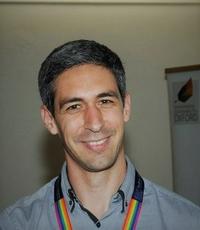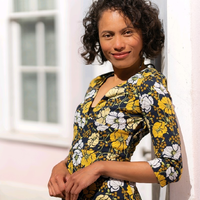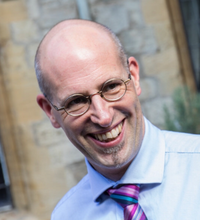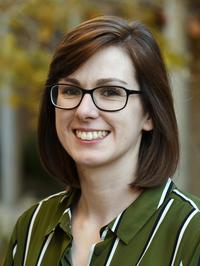Delivering positive environmental action
Our Environmental Sustainability Strategy commits to reaching net zero carbon and biodiversity net gain by 2035. For a large and complex institution such as Oxford, these challenging targets require the entire University community to play a part
Everyone has a role to play, whether that is making small changes to our daily routines, such as turning off appliances and commuting sustainably, joining an Oxford environmental group like Green Impact and LEAF (Laboratory Efficiency Assessment Framework), or taking part in initiatives within your department or college.

To mark Oxford Green Action Week, we are celebrating the work of a few members of the University community that showcases their environmental action, either as part of their role or on top of it. Each story highlights the influence we can all have – both in our professional roles and within our communities.
Jason Partridge, Open Access Service Manager, Bodleian Libraries, Collections Management

Green Impact has given good guidance, prompts and support (materials and moral) to help make this achievable. It also makes you feel part of something bigger, something tangible ... I’ve been particularly proud of how Osney One has come together and embraced environmental sustainability in the workplace, and I should stress that accolades ... are very much a joint effort and recognition of the whole building.
Jason works closely on the Oxford University Research Archive – ORA. Removing barriers and providing free access to as much of Oxford’s research as possible for anyone with internet access. Recently Jason took part in developing the ORA Climate Research Portal. A comprehensive resource that curates the cutting-edge research on climate and the environment at the University.
He is a member of the Green Impact Team for the Bodleian Libraries Osney One Building. The Osney One team has moved from strength to strength through the Green Impact criteria, achieving first Bronze, then Silver, Gold, and now Beyond Gold for the last four years in a row. Implementing a range of changes from ensuring that the appropriate bins are available for recycling, to installing a vegetable planter for the building, and developing the ORA Climate Research Portal.
That’s not to say it’s never challenging, as team members all have their own demanding positions within the University. Nonetheless, the Osney One team and Jason persist in devoting their time to make a green impact!
Kristine Homoki, Programme Advisor, Open Executive Education, Saïd Business School

Everyone has to do their part, and leading our Green Impact team is just a small part that I chose to play. The positive changes we have made make me feel even more inspired to keep going.
Kristine is a founding member of the Saïd Business Green Impact team, co-chairing with Heather Saunders for the past four years. The team has made great strides, implementing significant changes including, removing plastic water bottles from the conference and catering operations, installing water stations across the school, and introducing an innovative way to honour guests at the school with a tree planting.
To date, 150 trees have been planted as a part of this program. The Green Impact team at Saïd Business School has achieved multiple Gold awards over the years for these accomplishments.
She sees environmental action as aligning with the values of community, respect for biodiversity, and wellbeing. This is exemplified with the introduction of the Nature Club at Egrove Park. Every fortnight staff members are invited to participate in wellbeing hour and explore the beautiful Egrove Park, while engaging in nature surveys, tree planting, and other conservation activities.
Kristine acknowledges the immensity of the climate emergency, urging us all to take action and find solutions in our own communities.
Bart Ashton, Domestic Bursar, Lady Margaret Hall

I haven’t got any special training or qualifications in these areas, but I have got an enquiring mind and willingness to try something new. This has brought me into contact with all sorts of amazing imaginative people and I hope it’s meant that together we’ve reduced our impact and shown others what’s possible. Anyone can do this – and it doesn’t have to be a big project to have a big impact.
Bart has been at Lady Margaret Hall (LMH) since 2002, working for most of his tenure as Domestic Bursar. A role that has influence over or responsibility for many of the college’s potentially impactful activities including energy use, waste management, water use, procurement, business partnerships, food provision and building efficiency.
He continuously works to understand the impact of these activities and seeks out more sustainable options for the college. This has led LMH, and Bart personally, to be involved in several pilots and experimental work in the interests of making a range of areas more sustainable over the last ten years.
Bart has been instrumental in progressing environmental sustainability at LMH and fostering collaboration across the University and colleges. He founded the Oxford Colleges’ Sustainability Guild, a network with members deliberately drawn from different college roles, to provide a space to collaborate, learn and grow.
Dr Saroj Saurya, Research Scientist and Lab Manager, Dunn School of Pathology

The Dunn School Green Group had done marvellous work to get everyone in the department to be aware of the waste and set up various green initiatives. From waste reduction and introducing reusable glass containers instead of the single use plastic, to changes in practice that reduce the need for packaging or cold shipment of items.
All the green group members, current and past, are volunteers and are very passionate about doing something in the lab and at home to reduce the impacts of climate change.
Saroj has been working with the University for nearly 20 years as a research scientist. The initial inspiration that led Saroj to begin pursuing sustainability in her personal and professional life came after watching the BBC Blue Planet II series in 2019. Saroj was a founding member and now chairs the Dunn School Green Group.
She champions environmental sustainability in her department and across the University. Enthusiastically promoting the Laboratory Efficiency Assessment Framework (LEAF) and implementing significant changes within her own lab space. While continuing sustainable living outside of work and through volunteering in community.
Saroj’s efforts and those of her team led to the Raff Lab receiving a Silver LEAF accreditation in 2020 and Gold in 2021. These changes have become widespread across the Dunn School of Pathology, leading to an impressive 13 labs receiving accreditation as of 2021.
Charlotte Houghton, Sustainability Project Manager, Estates Services

The knowledge that I, along with my colleagues, and the wider University community are all working towards as shared goal is really motivating. Each 'win' feels like a huge step in the right direction towards the achievement of our Sustainability Strategy, and to mitigating the effects of climate change as much as we can.
Through her role with the University’s Environmental Sustainability team, Charlotte has seen the number of laboratories engaged with LEAF, to improve their environmental sustainability, more than double. There is great capacity within laboratories to integrate sustainable practices that lead to significant change – implementing small changes, such as reducing (–80) degrees freezers to (–70) degrees where appropriate, can save massive amounts of energy. Charlotte works directly with labs through LEAF where her work includes managing fume hood efficiency upgrades and case studies of innovative sustainability equipment.
She also works on a larger portfolio of carbon reduction projects across the University estate including, pump upgrades, data centre efficiency projects, and solar PV installation to list a few. Charlotte harnesses the power of a collective approach, working closely with building managers, the Safety Office, lab managers and external contractors to create changes to process and building fabric that will have a longstanding positive impact.


